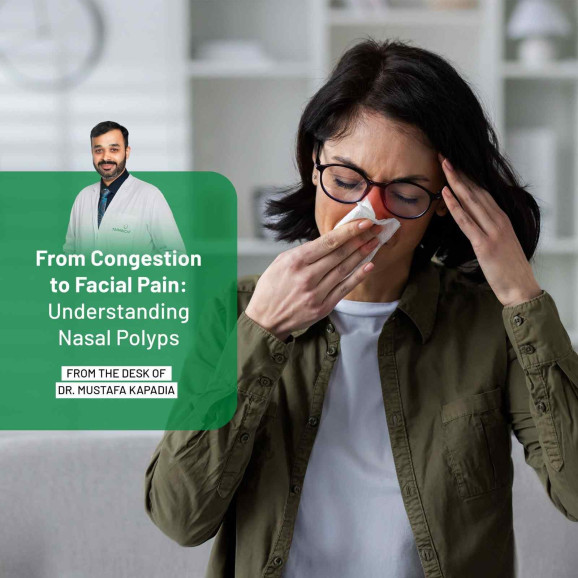From Congestion to Facial Pain: Understanding Nasal Polyps
Contact Us
Have you ever felt like your face is heavy, your head is full, and breathing through your nose seems impossible? You may have tried over-the-counter sprays or allergy medications, but nothing seems to help. One common cause of these persistent symptoms is nasal polyps soft, non-cancerous growths in the nose or sinuses.
Though benign, nasal polyps can block airflow, trap mucus, and create chronic facial pain, pressure, and headaches. The good news is they are treatable.
At Tarabichi ENT, recognized as the best ENT clinic in Dubai, the best ENT specialist in Dubai helps patients identify nasal polyps and create personalized treatment plans. In this blog, we’ll explain what nasal polyps are, how they cause discomfort, and the options available to help you breathe easier and feel more comfortable.
What Are Nasal Polyps?
Think of your sinuses like a system of small pipes inside your face. Normally, air flows freely, and mucus drains easily, keeping everything clean. Now imagine a soft, jelly-like growth forming inside one of these pipes, slowly blocking the flow. That’s essentially what a nasal polyp does.
Nasal polyps are soft, painless growths in the nasal lining or sinuses caused by chronic inflammation. Over time, the inflamed tissue swells and forms these growths, which can vary in size from tiny nodules to larger sacs that block the nasal passages.
Common Causes
- Chronic sinus infections (long-term inflammation)
- Allergies, such as hay fever or environmental triggers
- Asthma, especially if symptoms worsen with nasal issues
- Immune system overreactions, which can make inflammation worse
- Genetic conditions, though rare, such as cystic fibrosis
Even though the polyps themselves don’t hurt, the blockage they create leads to the pressure, congestion, and pain patients often feel.
How Nasal Polyps Cause Facial Pain and Pressure
Facial discomfort from nasal polyps is more than just a stuffy nose. Here’s a breakdown of how these growths create the symptoms many patients experience:
1. Blocked Airflow
When polyps grow, they narrow the nasal passages. Breathing becomes more difficult, and the sinuses can’t ventilate properly. Patients often describe it as feeling like their nose is “clogged from the inside,” and this lack of airflow contributes to facial heaviness.
2. Trapped Sinus Drainage
Your sinuses produce mucus that normally drains into the nasal cavity. Polyps can block these pathways, causing mucus to accumulate. The result is pressure, swelling, and sometimes headaches, as if your sinuses are “filling up like a blocked sink.”
3. Excess Mucus Production
Inflammation around the polyps signals the body to produce even more mucus, worsening the blockage. This is why some patients notice postnasal drip, a runny nose, or a constant feeling of congestion.
4. Infections
When mucus becomes trapped, bacteria can grow, leading to sinus infections. These infections intensify inflammation and pain, creating a cycle of discomfort that is difficult to relieve without professional care.
This combination of blocked airflow, trapped mucus, and inflammation explains why facial pressure, headaches, and sinus pain are so common in patients with nasal polyps.
Symptoms to Recognize
While nasal polyps can sometimes be small and unnoticed, larger growths often cause distinct symptoms:
- Facial pressure or pain around the cheeks, forehead, or eyes
- Persistent nasal congestion that doesn’t improve with over-the-counter remedies
- Reduced sense of smell and taste
- Runny nose or postnasal drip
- Snoring or mouth breathing (especially in children)
- Recurring sinus headaches
- Difficulty sleeping due to nasal blockage
Parents should pay attention if children exhibit restless sleep, constant congestion, or snoring, as these may indicate polyps. Consulting the best pediatric ENT in Dubai can help diagnose the issue early and prevent long-term complications.
How Nasal Polyps Are Diagnosed
Diagnosis starts with a careful examination and often includes imaging to understand the full extent of the problem. At Tarabichi ENT, the best ENT specialist in Dubai follows these steps:
- Physical Examination – Inspecting the inside of the nose for visible polyps or swelling.
- Nasal Endoscopy – A small, flexible camera is used to get a clear view of the nasal passages and sinuses.
- CT Scan or MRI – Provides detailed images to see size, number, and location of polyps.
- Allergy Testing – Determines if allergies contribute to inflammation and polyp growth.
Accurate diagnosis ensures that patients receive treatment tailored to their specific condition, helping to relieve symptoms effectively.
Treatment Options for Nasal Polyps
Treatment aims to reduce inflammation, open nasal passages, and prevent recurrence. Depending on the severity of the polyps, options include medication, surgery, lifestyle adjustments, and home care.
1. Medications
- Nasal steroid sprays shrink polyps and reduce swelling.
- Oral steroids may be prescribed for more severe cases.
- Antihistamines help manage allergy-triggered polyps.
- Biologics are advanced injections that target specific pathways in inflammation for long-term relief.
2. Surgical Treatment
If medications are insufficient, surgery may be necessary. The best ENT surgeon in Dubai at Tarabichi ENT performs endoscopic sinus surgery to remove polyps and restore normal sinus drainage. This minimally invasive approach reduces recovery time while improving long-term outcomes.
3. Addressing Underlying Conditions
Treating the root causes prevents polyps from returning:
- Allergy management through medications or immunotherapy
- Asthma control to reduce airway inflammation
- Chronic sinusitis treatment to maintain healthy sinuses
4. At-Home Care
- Saline nasal rinses to clear mucus and allergens
- Humidifiers to keep nasal passages moist
- Avoiding irritants such as smoke or strong chemicals
- Consistently following prescribed treatments to reduce inflammation
Common Questions Patients Ask About Nasal Polyps
1. Can nasal polyps go away on their own?
Small polyps sometimes shrink with proper allergy management or anti-inflammatory treatment. However, larger polyps usually persist and may require medication or minor surgery to relieve symptoms.
2. Are nasal polyps dangerous?
Nasal polyps are benign, meaning they aren’t cancerous. The main concern is the discomfort they cause blocked sinuses, facial pressure, headaches, and breathing difficulties. Left untreated, they can lead to chronic sinus infections.
3. Can children get nasal polyps?
Yes. Children can develop nasal polyps, especially if they have allergies, asthma, or certain genetic conditions. Consulting the best pediatric ENT in Dubai early ensures proper care and prevents long-term breathing problems.
4. Will surgery prevent nasal polyps from coming back?
Surgery removes existing polyps and opens blocked sinuses, but polyps can recur if underlying inflammation isn’t managed. That’s why post-surgery care, allergy management, and medications are important.
5. How soon will I feel better after treatment?
With medications, improvement can be noticeable in a few days to weeks. After surgery, many patients experience relief within a week or two, though full healing can take a few months. Regular follow-ups with the best ENT specialist in Dubai help ensure lasting results.
Gentle Relief and Better Breathing
Nasal polyps may be benign, but they can cause significant discomfort, including facial pain, sinus pressure, and chronic congestion. Understanding the condition and seeking the right care is the first step toward relief.
At Tarabichi ENT, recognized as the best ENT clinic in Dubai, best ENT doctors in Dubai and the best ENT surgeon in Dubai, it’s time to consult our team. Tarabichi Healthcare is committed to delivering world-class care with precision, expertise, and compassion.
Meet our dedicated specialists: Dr. Muaaz Tarabichi, Dr. Michael Timms, Dr. Mustafa Kapadia, Dr. Satish Jain and Dr. Jamal Kassouma.
We provide minimally invasive treatments tailored to your condition, with a strong focus on safety, accuracy, and long-term results.
For Consultations and Appointments, reach out to us at




